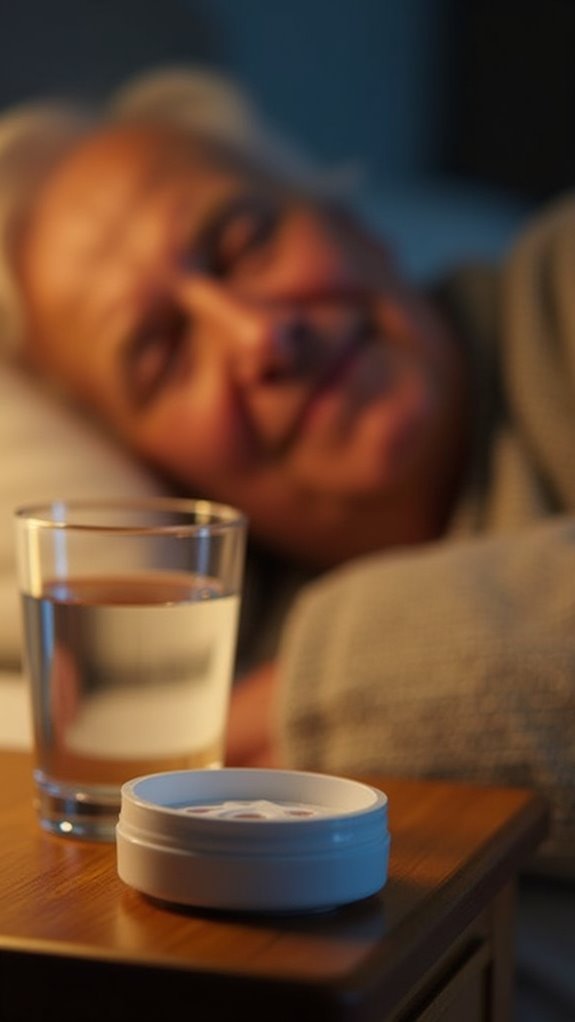What Happens If You Sleep With Dentures? Risks & Tips
As a mattress expert and sleep product tester, I often find myself in conversations about all things sleep-related. Recently, a friend asked me about wearing dentures while sleeping, and I couldn’t help but share my own experience. Trust me, sleeping with dentures in may seem like a time-saver, but it can lead to some serious issues. Your mouth deserves a break, and so does your jaw! Let me share what I learned the hard way.
Why Do Some People Sleep With Dentures?

While dental professionals typically recommend removing dentures at night, many wearers choose to keep them in during sleep for perfectly understandable reasons.
Convenience tops the list for most people. I’ve found that many new denture wearers simply want to adjust to the feel without interruption. It’s like breaking in a new mattress—constant wear helps you get comfortable faster.
When I first got my dentures, I kept them in at night because taking them out felt strange—until my gums started aching a week later. This common mistake can lead to serious oral health complications including gum disease and sore gums.
Proper denture care requires giving your mouth a nightly rest.
What Happens If You Sleep With Dentures?

Despite feeling tempted to keep your dentures in overnight, sleeping with them can trigger a cascade of oral health problems that affect both your mouth and overall well-being.
When you wear dentures while sleeping, three main issues arise:
- Immediate gum irritation and soreness occur as tissues can’t breathe.
- Bacteria buildup significantly increases, especially with full dentures covering more surface area than partial dentures.
- Long-term complications develop, including serious infections and gradual changes to your jaw structure.
I always recommend you remove your dentures before bed—proper denture health care requires giving your mouth this essential rest period every night.
3 Big Risks of Overnight Denture Wear

Sleeping with your dentures might seem convenient, but I’ve found it’s a risky habit that can lead to some serious health issues.
You’re looking at increased chances of oral thrush from trapped bacteria, a higher risk of pneumonia (especially in older adults), and accelerated jaw bone loss over time.
These risks aren’t worth the few minutes you save at night, and I’ll explain exactly why removing those dentures before bed needs to be non-negotiable for your health.
1. Thrush From Bacteria
When you leave your dentures in overnight, you’re essentially creating the perfect environment for bacteria and fungi to thrive. This can lead to oral thrush, a fungal infection that affects your dental health.
Poor denture care and maintenance significantly increase the risk of denture stomatitis. As Dr. Maria Lopez from the World Health Organization warns, “Sleeping with your dentures can disrupt oral health, especially if they’re not cleaned properly.”
To prevent these oral health problems:
- Remove and clean dentures nightly
- Soak them in a proper cleaning solution
- Never wear dentures at night to let your gum tissue breathe
2. Higher Pneumonia Risk
Perhaps the most alarming consequence of sleeping with your dentures in goes beyond your mouth.
I’ve seen patients who didn’t realize that sleeping in your dentures significantly increases pneumonia risk. A 2015 study from the U.S. National Institutes of Health confirmed this danger—denture wearers who kept dental appliances in overnight faced higher pneumonia rates.
Why? While you sleep, bacteria multiply on dentures, creating a breeding ground that leads to swallowing bacteria during the night.
Ill-fitting dentures worsen this by causing sores and inflammation, compromising your immune response.
No, it’s not okay to sleep with dentures. To keep your mouth healthy and protect your overall health, remove and clean dentures nightly.
3. Jaw Bone Loss
Continuous pressure on your jawbone represents another serious risk of keeping dentures in overnight. When you wear your dentures 24/7, you’re applying constant pressure that accelerates jaw bone loss after tooth loss. This changes your denture fit over time, making them uncomfortable and loose.
Here’s what happens:
- Constant pressure reduces bone density, causing your jaw to shrink faster.
- Partial denture wearers experience uneven bone loss, leading to an imbalanced bite.
- Poor-fitting dentures eventually require more dental adhesive, creating a frustrating cycle.
I always remove and clean my dentures nightly, which helps prevent both dry mouth and preserves my jawbone health.
Surprising Benefits You Might Not Expect
Although dentists typically recommend removing dentures at night, there are a few surprising advantages to occasionally sleeping with them in.
I’ve found that wearing your dentures at night can temporarily maintain gum shape, which might improve your appearance when you’re concerned about facial structure changes.
Immediate dentures, fitted right after extraction, may actually need to be worn overnight initially to aid healing, per your dentist’s instructions.
For some people, the confidence of never being without teeth—even while sleeping—matters significantly.
That said, these benefits don’t outweigh the risks for regular overnight wear of full or partial dentures.
Balance is key.
How to Care for Dentures If You Sleep With Them

If you’re going to sleep with your dentures occasionally, you’ll need to follow a strict care routine to minimize risks.
I’ve found that thoroughly brushing my dentures and soaking them in a cleaning solution at least once daily helps prevent bacterial buildup that can lead to infections.
Ensuring your dentures fit properly is crucial for comfort during sleep, as ill-fitting dentures can cause painful pressure points that disrupt your rest quality.
Brush and Soak
Proper cleaning becomes non-negotiable if you’re among those who sleep with dentures.
I’ve found that removing and cleaning dentures regularly dramatically reduces your risk for developing tooth decay and oral infections. The CDC confirms that proper cleaning kills up to 90% of bacteria!
For optimal hygiene when wearing dentures during sleep:
- Brush your dentures thoroughly before bed to remove food particles or bacteria that accumulated throughout the day.
- Soak your dentures in denture cleanser (even if briefly) to disinfect areas your brush can’t reach.
- Don’t forget to brush your gums gently to stimulate circulation and remove plaque buildup.
Ensure Good Fit
Wearing ill-fitting dentures while you sleep creates a double problem – not only do they disrupt your rest, but they also significantly increase irritation and tissue damage.
Loose dentures shift around, causing painful sores that make living with dentures uncomfortable.
I recommend scheduling regular dentist checkups to adjust your false teeth. As someone who’s helped countless patients with their missing teeth issues, I can tell you that maintaining a good fit is essential if you’re keeping dentures in place overnight.
When dentures fit properly, you’ll experience less irritation and better sleep quality.
Have your dentures evaluated every day for changes, especially if you wear them 24/7.
Remove Most Nights
While keeping dentures in overnight occasionally won’t cause immediate harm, your gums desperately need regular breaks from constant pressure.
I always remind my patients at our denture clinic that leaving your dentures out at night gives gums a break and reduces pressure for health.
For those who choose to sleep with their new teeth occasionally:
- Rinse thoroughly before bed to remove food particles that could irritate gums
- Clean them immediately upon waking before resuming eating and speaking
- Schedule regular check-ups to ensure they’re not causing damage while you wear partial dentures
If you have questions about sleeping in dentures, consult your dentist for personalized advice.
Why Dentists Say Take Them Out at Night

Dentists unanimously recommend removing your dentures before bedtime, and I’ve learned why the hard way.
It’s never okay to sleep with dentures regularly, as they may shift around and damage both your gums and any remaining natural teeth.
Your mouth needs a break! Taking out dentures before going to bed allows your gums to rest and restores natural saliva flow.
Dentures also collect bacteria when worn 24/7, which increases your risk of infections and long-term oral damage.
I now remove mine nightly and store them properly—my morning breath and gum health have dramatically improved.
Worth the extra two minutes!
Frequently Asked Questions
Can Sleeping With Dentures Cause Sleep Apnea?
Yes, sleeping with dentures can potentially contribute to sleep apnea. When I wear dentures while sleeping, they may block my airway or cause my throat muscles to relax improperly, increasing my risk of breathing interruptions.
How Long Does It Take to Adjust to Removing Dentures Nightly?
It typically takes me 2-3 weeks to adjust to removing dentures nightly. I found creating a consistent bedtime routine helps me adapt faster. You’ll likely feel strange at first, but it becomes natural soon.
Do Partial Dentures Pose the Same Overnight Risks as Full Dentures?
Yes, partial dentures pose similar overnight risks as full dentures. I recommend removing them while you sleep to prevent bacteria buildup, gum inflammation, and potential bone loss—just as you would with complete dentures.
Can I Take a Short Nap Without Removing My Dentures?
I wouldn’t recommend napping with dentures, even briefly. Short naps can still contribute to bacterial buildup, tissue inflammation, and potential choking hazards. For your oral health and safety, it’s best to remove them first.
Are Implant-Supported Dentures Meant to Be Removed During Sleep?
Yes, even implant-supported dentures should typically be removed during sleep. I recommend taking them out nightly to give your mouth tissues rest and prevent potential complications like inflammation or increased infection risk.
In Conclusion
I’ve faced the denture dilemma myself—trust me, taking them out at night is worth it. The risks are real: increased infections, gum irritation, and accelerated bone loss. Your sleep quality improves significantly when dentures soak instead of shifting in your mouth.
In summary, sleeping with dentures can lead to various health issues that affect both your mouth and overall well-being. Prioritizing your oral health by removing dentures at night allows your mouth to rest and rejuvenate. Your morning self (and your dentist) will thank you for making this important nighttime habit a priority.
